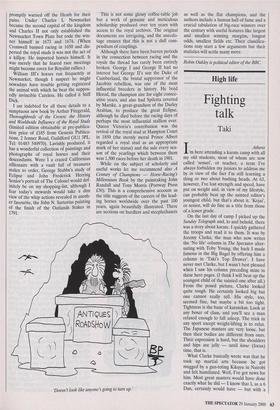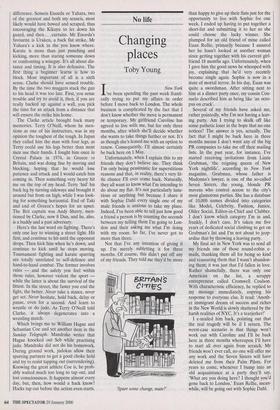High life
Fighting talk
Taki
'm here attending a karate camp with all my old students, most of whom are now called `sensei', or teacher, a term I've always forbidden my juniors to address me by in view of the fact I'm still learning a thing or two about bashing heads. At 63, however, I've lost strength and speed, have put on weight and, in view of my lifestyle, can probably beat up the sainted editor's youngest child, but that's about it. `Kojai', or senior, will do fine as a title from those of a lesser grade.
On the last day of camp I picked up the Sunday Telegraph and, lo and behold, there was a story about karate. I quickly gathered the troops and read it to them. It was by Jeremy Clarke, the man who now writes the 'No life' column in The Spectator alter- nating with Toby Young, the hack I made famous in the Big Bagel by offering him a column in `Taki's Top Drawer'. I have never met Clarke, but I wasn't best pleased when I saw his column preceding mine in these here pages. (I think I will beat up the youngest child of the sainted one after all.) From the posed picture, Clarke looked quite tough. He certainly looked big but one cannot really tell. His style, too, seemed fine, but maybe a bit too tight. Tightness is the bane of karatekas. Look at any boxer of class, and you'll see a man relaxed enough to fall asleep. The trick in any sport except weight-lifting is to relax. The Japanese masters are very loose, but then their bodies are different from ours. Their expression is hard, but the shoulders and hips are jelly — until kime (focus) time, that is.
What Clarke basically wrote was that he took up martial arts because he got mugged by a gun-toting Kikuyu in Nairobi and felt humiliated. Well, I've got news for him. Most great masters would have done exactly what he did — I know that I, as a 6 Dan, certainly would have — but with a difference. Senseis Enoeda or Yahara, two of the greatest and both my senseis, most likely would have bowed and scraped, thus encouraging the Kikuyu to let down his guard, and then ... curtains. Mr Enoeda's favourite is Uraken, a back fist strike, Mr Yahara's a kick in the you know where. Karate is more than just punching and kicking, more than staring someone down or confronting a wiseguy. It's all about dis- tance and timing. It is also defensive. The first thing a beginner learns is how to block. Most important of all is a sixth sense. Clarke should have sensed trouble. By the time the two muggers stuck the gun to his head it was too late. First, you sense trouble and try to avoid it, then, if you are really backed up against a wall, you pick the time for an attack from a distance that will ensure the strike hits home.
The Clarke article brought back many memories. Terry O'Neill, whom he men- tions as one of his instructors, was in my opinion the toughest of the tough. In Japan they called him the man with four legs, as Terry could use his legs better than most men use their hands. I fought him once in Crystal Palace in 1974, in Greece vs Britain, and was doing fine by moving and blocking, hoping that he would lose patience and attack and I would catch him coming in. Then something very heavy hit me on the top of my head. Terry 'hid' his back leg by turning sideways and brought it around but from on high, while I was look- ing for something horizontal. End of Taki and end of Greece's hopes for an upset. The Brit captain was Andy Sherry, men- tioned by Clarke, now 8 Dan, and he, also, is a buddy and a past adversary.
Here's the last word on fighting. There's only one key to winning a street fight. Hit first, and continue to hit until the opponent drops. Then kick him when he's down, and continue to kick until he stops moving. Tournament fighting and karate sparring are totally unrelated to self-defence and hand-to-hand combat. The former involves rules — and the safety you feel within those rules, however violent the sport — while the latter is about the survival of the fittest. In the street, the faster you end the fight, the better. Never take a stance, never get set. Never hesitate, hold back, delay or pause, even for a second. And learn to wrestle or do judo. As Terry O'Neill told Clarke, it always degenerates into a wrestling match.
Which brings me to William Hague and Sebastian Coe and yet another item in the Sunday Telegraph. Mandrake writes that Hague knocked out Seb while practising judo. Mandrake did not do his homework. During ground work, judokas allow their sparring partners to get a good choke hold and try to resist tapping out (surrendering). Knowing the great athlete Coe is, he prob- ably waited much too long to tap out, and lost consciousness. It happens almost every day, but, then, how would a hack know? Hacks tap out before the action even starts.



















































































 Previous page
Previous page